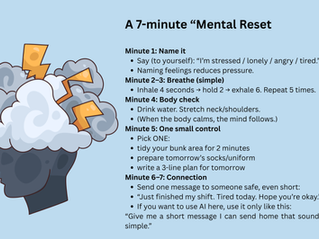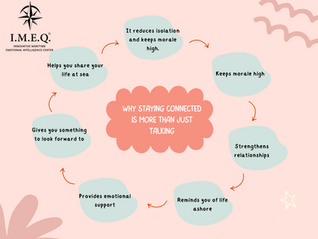Parenting from a Distance – Supporting Children While Working at Sea
- IMEQ CENTER

- Apr 30, 2025
- 4 min read

Being a parent while working at sea is tough. You miss birthdays, school events, and everyday moments with your children. Long contracts, time zone differences, and poor internet connections can make it even harder to stay connected.
But being far away doesn’t mean you can’t be a great parent. With the right strategies, you can still have a strong, loving relationship with your child, even from thousands of miles away.
The Challenges of Parenting from a Distance
1. Communication Issues
Staying in touch with your child can be difficult due to:
Limited internet access – Wi-Fi onboard is often slow, expensive, or unreliable.
Time zone differences – When you’re free, your child might be asleep or at school.
Short conversations – Calls may feel rushed, leaving you feeling disconnected.
Misunderstandings – Texts or short calls can sometimes create distance instead of closeness.
2. Emotional Challenges
Missing Important Moments – Not being there for milestones can cause sadness or guilt.
Struggles at Home – Children may act out or feel distant due to your absence.
Feeling Left Out – Parents at sea may feel disconnected from their child's daily life.
3. The Impact on Children
Children react to an absent parent in different ways:
Young children (0–5 years): They may not understand why you’re gone and feel anxious.
School-aged children (6–12 years): They might feel sad, develop behavioral issues, or struggle in school.
Teenagers (13+ years): They may seem independent but could also feel resentful or emotionally distant.
Understanding these challenges helps you take action to stay connected and involved in your child’s life.
Practical Strategies for Seafarer Parents
1. Make Communication Easier and More Meaningful
Since calls and messages might be limited, focus on quality over quantity.
Use multiple ways to stay in touch: If calls are difficult, send voice notes, short videos, or emails. Pre-record bedtime stories or goodnight messages so your child hears your voice even when you can’t call.
Plan calls around your child's schedule: Try to call before school or bedtime so they don’t feel interrupted during their day.
Create a “Question of the Day” tradition: Ask a fun or thoughtful question during every call (e.g., “What made you happy today?” or “If you could be any animal, what would you be?”). This keeps conversations engaging instead of just “How was your day?”
Accept that some calls will be short or awkward: If your child doesn’t talk much, don’t pressure them. Just remind them you love them and will talk again soon.
Example: A seafarer dad records a “good morning” message every day before his shift, so his child wakes up to his voice, keeping a daily connection.
2. Stay Involved in Your Child’s Life from Afar
Even if you’re away, you can still be an active parent.
Follow their interests: Ask about their hobbies, favorite games, or school activities. Show excitement about what they love.
Help with schoolwork remotely: If the internet allows, help with assignments through voice notes or texts.
Celebrate achievements: Even small things like finishing a school project deserve encouragement. A simple “I’m proud of you” goes a long way.
Example: A seafarer mom and her son both keep a journal. They write about their days and share the pages when she returns.
3. Create Special Family Traditions
Having shared rituals makes children feel emotionally connected.
“Same Movie, Same Day” Activity: Pick a movie to watch separately, then talk about it in your next call.
Family Photo Calendar: Leave behind a calendar with pictures and write small notes for special days.
Matching Items: Wear the same bracelet, necklace, or keychain so your child feels connected to you.
Example: A father and daughter both have star stickers. Every night, they place one on their walls to remind them they are looking at the same sky.
4. Prepare for Departures and Homecomings
Leaving and returning home can be emotional for both you and your child.
Before leaving: Spend extra time together, do their favorite activities, and explain your departure honestly. Avoid saying “I’ll be home soon” if you have a long contract.
During the contract: Keep them updated on your return date so they have something to look forward to.
Coming home: Give them time to adjust. Some children may act distant at first because they are used to being without you. Be patient and slowly reconnect.
Example: A seafarer dad makes a countdown chart with his kids before leaving, so they can track the days until his return.
5. Support the Parent or Guardian at Home
Parenting is a team effort, and your partner or co-parent needs support too.
Appreciate their effort: Acknowledge that they are managing everything alone while you’re away.
Back up their parenting decisions: Avoid undermining their rules or discipline when you return home.
Give them a break when home: Help with childcare and household tasks so they can rest.
Example: A seafarer mom ensures her husband gets a weekend off when she returns, recognizing the work he did alone while she was away.
By using these practical strategies, seafarer parents can make sure their children feel secure, loved, and supported—no matter how many miles separate them.
Alexandra Kaloulis
IMEQ TEAM





































































































Comments